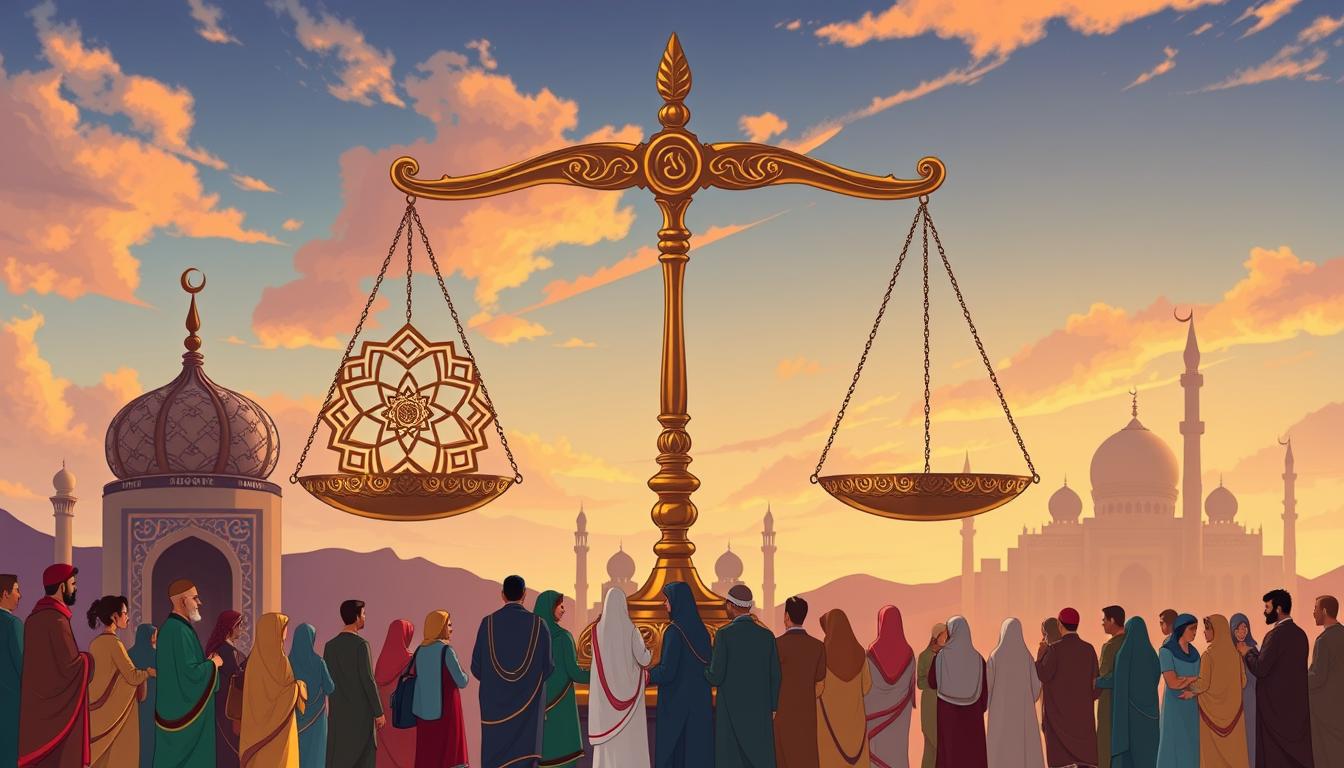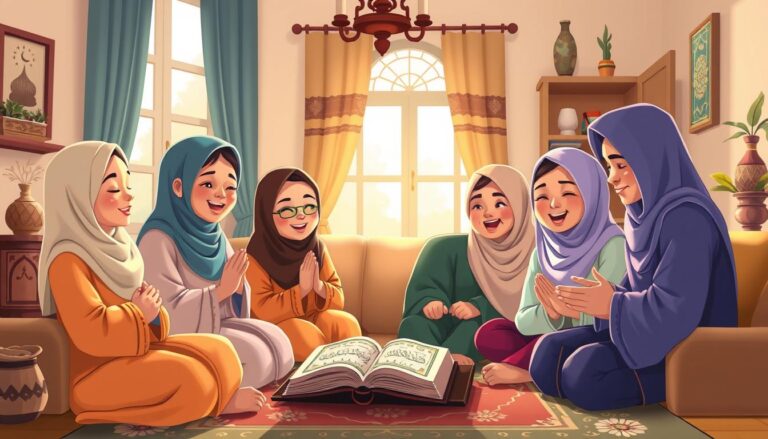How Islam Promotes Fairness in Society
Have you ever thought about how a misunderstood religion could stand for social justice? Islam, with its deep teachings, offers a clear answer. It focuses on fairness, equality, and kindness as key parts of faith and everyday life.
The Quran and Prophet Muhammad’s teachings give a full guide for social duty. This advice goes beyond just being a good person. It includes caring for family, community, and nature. Islam’s fairness isn’t just about treating everyone the same. It’s about seeing the value in every person, no matter who they are or where they come from.
In Islam, true greatness isn’t about money or power. It’s about being righteous and doing good. This view changes how we see the world and pushes for a fairer society. By focusing on human rights and justice, Islam tells its followers to help make the world a better place.
Key Takeaways
- Islam prioritizes fairness and justice as core religious values
- The Quran provides guidance on social responsibility and community unity
- Islamic teachings promote respect and dignity for all individuals
- Righteousness, not worldly status, determines a person’s worth in Islam
- Islam encourages active participation in creating a just society
Understanding the Islamic Concept of Fairness
Islamic ethics and moral values are key to fairness in Islam. The Quran guides us on how to be fair in society.
Defining Fairness in Islamic Context
In Islam, fairness means justice and equality. The Quran, especially Surah An-Nisa (The Women), teaches us about social duties. This chapter, with 176 verses, shows the need for fair treatment in life.
Quranic Verses Emphasizing Justice and Equality
The Quran clearly teaches about fairness:
- Quran 4:7 talks about fair inheritance for men and women
- Quran 4:19 says we can’t inherit women against their will
- Quran 4:58 reminds us to return what’s owed and judge fairly
- Quran 4:135 tells us to stand up for justice, even when it’s hard
Prophet Muhammad’s Teachings on Fairness
The Hadith, or sayings of Prophet Muhammad, also teach about fairness. In his Farewell Hajj address, he stressed the safety of life and property for all Muslims. This shows how important individual rights are in Islamic societies.
“None of you truly believes until he wishes for his brother what he wishes for himself.”
This Hadith shows the heart of fairness in Islam. It encourages empathy and equal treatment for everyone in society.
The Principle of Equality in Islam
Islam teaches that all humans are equal in Allah’s eyes. This idea is at the heart of Islamic teachings on equality and human rights. The Quran says the most honored are those who are most righteous, not based on race, wealth, or status.
Prophet Muhammad also stressed this point. He said, “People are equal as the teeth of a comb.” This metaphor shows how Islam views equality. It means humans are all equal, despite our differences.
“The most valued individual is the one who performs the most good deeds, irrespective of race or ethnicity.” – Prophet Muhammad
Islamic teachings also focus on fairness. They say:
- All people are born equal and die equal
- Individuals are judged based on their own merits and deeds
- Privilege and discrimination are incompatible with Islamic principles
The Universal Islamic Declaration of Human Rights also supports these ideas. It says all persons should have equal opportunities and legal protection. This declaration connects Islamic teachings with today’s human rights, pushing for equality and justice for everyone.
How Islam Promotes Fairness in Society
Islam values fairness and equality highly. It offers a detailed plan for social justice, economic fairness, and gender equality.
Social Justice in Islamic Teachings
Islamic teachings believe all humans are equal before Allah. The Quran and Hadith teach justice for everyone, no matter their beliefs. This idea guides how Muslims act and govern in their communities.
Economic Fairness through Zakat and Charity
The Zakat system is key to economic fairness in Islam. It asks Muslims to give 2.5% of their wealth to the needy. This act helps spread wealth and has inspired social welfare programs in places like Malaysia and Turkey.
Gender Equality in Islamic Principles
Islam supports women’s rights deeply. The Quran (4:124) says men and women are equal in doing good deeds. It doesn’t set specific roles for men and women, as these are shaped by culture and society.
“O mankind, indeed We have created you from male and female and made you peoples and tribes that you may know one another. Indeed, the most noble of you in the sight of Allah is the most righteous of you.” – Quran 49:13
Islam works to build a fair society. It wants everyone to succeed, no matter their background.
Islamic Ethics and Fair Treatment
Islamic moral values are key in Muslim societies. They guide how people act every day, pushing for fairness and helping others. The Quran and Hadith teach Muslims to be kind and respectful to everyone.
Compassion as a Moral Duty
In Islam, being kind is not just a good thing; it’s a must. The Prophet Muhammad said, “None of you truly believes until he loves for his brother what he loves for himself.” This shows how important it is to care for others in Islamic ethics.
Treating Others with Respect and Dignity
Islam teaches us to respect everyone, no matter who they are. The Quran (4:135) says, “Whether one is rich or poor, Allah is more worthy of both.” This verse shows that Islam believes in treating everyone equally.
Standing up Against Discrimination
Muslims are urged to fight against unfairness and injustice. The idea of ‘Adab’ in Islam is about being polite and having good manners. By standing up for what’s right, Muslims do their part in making society better.
Islamic ethics also apply to work and health care. The idea of ‘Ihsan’ encourages Muslims to do good deeds well and truly. This makes it clear that being ethical is important in all parts of life.
Fairness in Islamic Law and Governance
Islamic jurisprudence is the base of fairness in Muslim communities. Sharia law, based on the Quran and Prophet Muhammad’s teachings, focuses on fair governance and equal treatment. It believes divine laws are above human-made ones, leading to higher justice standards.
In Islamic history, fair governance started in the early Caliphates from 622 to 632 CE. Leaders were judged by the same laws as everyone else, promoting equality and justice. This idea still shapes modern Islamic societies, with different views on Sharia law.
The role of fairness in Islamic governance is clear in the work of key figures:
- Qadis (Islamic judges) judge cases based on Sharia principles
- Muhtasibs (market inspectors) make sure trade is fair
- Diwan (government departments) manage administration and finance
These groups work together to keep justice and fairness alive. Waqf (charitable endowments) also plays a part by funding schools, hospitals, and religious places. This ensures everyone has access to important services.
“The best of people are those who bring most benefit to the rest of mankind.” – Prophet Muhammad
Despite challenges, Islamic jurisprudence guides efforts towards creating fair and just societies in Muslim-majority countries.
Promoting Inclusivity and Brotherhood in Muslim Communities
Islam values Muslim unity and community cohesion a lot. The Quran says diversity is a blessing from God. It helps people understand and appreciate each other.
Breaking down social barriers
The Islamic faith believes in equality and fights against discrimination. It doesn’t matter what your race, ethnicity, or social status is. This is shown in Surah Al-Ḥujrāt:
“O mankind, We have created you from male and female and made you peoples and tribes that you may know one another. Indeed, the noblest of you in the sight of Allah is the most righteous of you” (Quran 49:13).
Fostering harmony and peaceful coexistence
Muslim communities aim for mutual respect and cooperation. The Pact of Medina, from 622 CE, showed equal rights for all. Today, groups like the Muslim-Jewish Advisory Council in the U.S. support dialogue and cultural exchange.
Resolving conflicts through Islamic principles
Islam guides us in solving conflicts with forgiveness and fairness. The Quran tells us to “invite to the way of your Lord with wisdom and good instruction, and argue with them in a way that is best” (Quran 16:125). This helps keep our communities strong.
By following these teachings, Muslim communities can build inclusive places. They value diversity and work together, showing the true spirit of Islamic brotherhood.
Islamic Teachings on Fair Business Practices
Islamic finance and ethical business are key in Islam. The Quran talks about fairness and justice in life, including business. It says, “And O my people, perfect the measure and the balance with justice and do not make the people short of their things, and do not go about the earth spreading disorder” [11:85].
Prophet Muhammad taught about fair labor. He said, “Pay the laborer his wages even before his sweat dries.” This shows Islam’s belief in quick and fair payment for work.
The idea of Qat Halal in Islam is about earning legally. It helps Muslims stay spiritually and morally sound in business. Islamic ethics demand honesty in all life areas, including business and social dealings.
- Islam condemns dishonesty in all forms of trade
- Fair business practices align with Islamic principles
- Economic justice is a core tenet of Islamic finance
These teachings on ethical business match modern ideas like Fair Trade. Fair Trade helps poor producers and workers, improving their lives. This fits well with Islam’s views on economic justice and ethical business.
By following these teachings, Muslims can do business fairly and with respect. This not only helps them but also makes the world economy more just and fair.
The Role of Education in Promoting Fairness in Islam
Islamic education is key in teaching fairness and justice. It mixes learning with ethical values. This makes people who help their communities grow.
Islamic Schools and Ethical Values
Islamic schools focus on teaching ethics. They aim to make students knowledgeable and morally upright. These schools teach students to care for others and their community.
Continuous Learning in Islam
In Islam, learning never stops. Prophet Muhammad said, “Seeking knowledge is obligatory upon every Muslim.” This has led to many achievements in science and more.
Promoting Critical Thinking and Justice
Islamic education boosts critical thinking and justice. It helps people deal with today’s problems. This education has real benefits:
- A 25% decrease in feelings of isolation within communities
- A 15% increase in personal growth and spiritual fulfillment
- A 30% decrease in discrimination in societies upholding Islamic values
Islamic education makes people who stand up for fairness and equality. They do this in their daily lives and in society.
Conclusion
Islamic fairness is key to building a fair society. The Quran and the Prophet Muhammad’s life teach us about justice and equality. These teachings help us strive for a world where everyone is treated fairly.
Islamic fairness is for everyone, not just Muslims. It shows in how leaders like Caliph Omar Ibn el Khattab ruled. Islam also teaches us to help those in need, showing its dedication to justice.
In recent years, Islam has reaffirmed its commitment to fairness and human rights. The Universal Islamic Declaration of Human Rights in 1981 highlighted the importance of dignity and honor for all. Now, we must work to make these ideals a reality, creating a fair society for everyone.
Source Links
- A Sacred Duty: Islam and Social Justice | Yaqeen Institute for Islamic Research
- Islam’s Teachings On Social Justice And Equality – Mahim Dargah
- Fairness and Social Responsibility in Islam – Muslim Women Australia
- Human Rights in Islam
- Equality in Islam
- Microsoft Word – 29B-AJBAS special 2012
- Gender Equality and Justice in Islam – DARUS SALAAM
- Islamic Perspectives on Social Justice – GlobalSadaqah.com Blog
- Islamic Attitudes Towards Equality
- Islamic Ethics: Guiding Principles
- Islamic ethics and moral philosophy | Islamic World Class Notes | Fiveable
- Islam and the Rule of Law
- Islamic Governance in History | Islamic World Class Notes
- The Role of Islamic Values in Fostering Harmony for Nation-Building
- Islam teaches and encourages unity in diversity
- Ethics and Fairness in Business according to Islam
- Islam and Fair Trade | Virtual Mosque
- Education in Islam: Comprehensive Insights into Concepts, Nature, Goals, and Principles – International Journal of Research and Innovation in Social Science
- Why Islamic Values Matter in Today’s World – ICE Islamia School
- Social Justice in Islam
- University of Minnesota Human Rights Library
- The Islamic Basis of Social Work in the Modern World – International Journal of Social Work Values and Ethics







